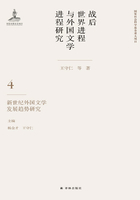
第一章 后现代主义文学的流变与影响
麦克黑尔在其《决裂、时代、空位》一文中说“:20世纪70年代初至80年代末代表了后现代主义文化的顶峰,就此见解,我认为很少有人反对。” 一般来说,顶峰期过后就开始衰落,因此,90年代后现代主义被认为已经落潮。1991年德国斯图加特大学召开文化研讨会,邀请哈桑、巴思、费德曼、加斯和布拉德伯里等学者和作家参加,会议的主题为“后现代主义的终结:新方向”。
一般来说,顶峰期过后就开始衰落,因此,90年代后现代主义被认为已经落潮。1991年德国斯图加特大学召开文化研讨会,邀请哈桑、巴思、费德曼、加斯和布拉德伯里等学者和作家参加,会议的主题为“后现代主义的终结:新方向”。 布拉德伯里在1994年指出,“我们或许已经抵达了后现代时期的末途,并正在进入一个还没有形成清晰轮廓、清晰前景和清晰名称的新时期”。
布拉德伯里在1994年指出,“我们或许已经抵达了后现代时期的末途,并正在进入一个还没有形成清晰轮廓、清晰前景和清晰名称的新时期”。 伯滕斯1995年的重要著作《后现代的概念:一段历史》也暗示了后现代主义正滑入历史范畴,不再是当下解释世界的预设模式。
伯滕斯1995年的重要著作《后现代的概念:一段历史》也暗示了后现代主义正滑入历史范畴,不再是当下解释世界的预设模式。 但是,正如本书第二卷《后现代主义文学研究》所论述的,在90年代,后现代主义虽然进入“颓势时期”,但并未“终结”。在不少批评家看来,“是新千年这一转折点,特别是‘9·11’扰乱了集体想象,它也成为迫使后现代时期陷入危机并使之一次性成为历史的最终动因”。
但是,正如本书第二卷《后现代主义文学研究》所论述的,在90年代,后现代主义虽然进入“颓势时期”,但并未“终结”。在不少批评家看来,“是新千年这一转折点,特别是‘9·11’扰乱了集体想象,它也成为迫使后现代时期陷入危机并使之一次性成为历史的最终动因”。 托特和布鲁克斯认为后现代主义“被永远给埋葬在世贸中心大楼的瓦砾里”。
托特和布鲁克斯认为后现代主义“被永远给埋葬在世贸中心大楼的瓦砾里”。 “9·11”事件成了对后现代主义的致命一击,这反映了历史进程对文学进程的决定性影响。
“9·11”事件成了对后现代主义的致命一击,这反映了历史进程对文学进程的决定性影响。
后现代主义往往割裂语言和外部世界的联系。他们认为,文学作品是人工制品,所反映的现实不过是“虚构物”,而并非客观世界。然而,“9·11”恐怖袭击事件中近三千人丧生,这一血淋淋的现实悲剧向世人昭示,现实世界的客观性并非解构主义所宣称的那样可以消解,作家不能也不可能无视周遭生活而沉溺于文字游戏。从这个角度看,齐泽克(Slavoj Žižek)“‘9·11’以某种方式终结了后现代主义”的论断不无道理。
进入21世纪,人们把目光放到后现代主义之后, 要超越后现代主义。
要超越后现代主义。 但是,后现代主义是否真如柯比等人所言已经死了,
但是,后现代主义是否真如柯比等人所言已经死了, 而要为它“守灵”?
而要为它“守灵”? 从各国实际情况来看,事实并非那么简单。“9·11”事件无疑是一个重要的观察点,但过分强调其重要性未免有“美国中心主义”的偏颇,而后现代主义文学如同文学史上其他文学流派或文学运动,并不会戛然而止。换言之,后现代主义在“9·11”事件之后并未完全销声匿迹,在有的国家日渐式微,在另一些国家则依然充满活力。即便它的“肉身”业已腐烂,但精神犹在。21世纪的世界文学尽管发生了深刻的变化,但依然深受后现代主义的影响。
从各国实际情况来看,事实并非那么简单。“9·11”事件无疑是一个重要的观察点,但过分强调其重要性未免有“美国中心主义”的偏颇,而后现代主义文学如同文学史上其他文学流派或文学运动,并不会戛然而止。换言之,后现代主义在“9·11”事件之后并未完全销声匿迹,在有的国家日渐式微,在另一些国家则依然充满活力。即便它的“肉身”业已腐烂,但精神犹在。21世纪的世界文学尽管发生了深刻的变化,但依然深受后现代主义的影响。